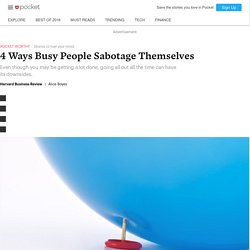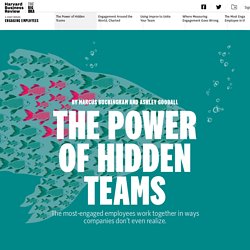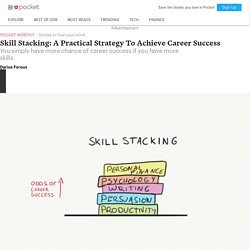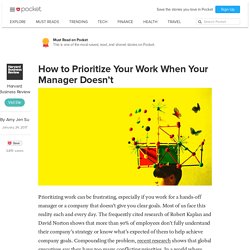

This Morning Routine Will Save You 20+ Hours Per Week. The traditional 9–5 workday is poorly structured for high productivity.

Perhaps when most work was physical labor, but not in the knowledge working world we now live in. Although this may be obvious based on people’s mediocre performance, addiction to stimulants, lack of engagement, and the fact that most people hate their jobs — now there’s loads of scientific evidence you can’t ignore. The Myth of the 8 Hour Workday The most productive countries in the world do not work 8 hours per day.
Actually, the most productive countries have the shortest workdays. People in countries like Luxembourg are working approximately 30 hours per week (approximately 6 hours per day, 5 days per week) and making more money on average than people working longer workweeks. This is the average person in those countries. How to Be More Productive Without Putting in Extra Hours. 4 Ways Busy People Sabotage Themselves. Photo from ImageGap/Getty Images.

You’ve left an important task undone for weeks. It’s hanging over you, causing daily anxiety. And yet instead of actually doing it, you do a hundred other tasks instead. Or you’ve been feeling guilty about not replying to an email, even though replying would only take 10 minutes. Or maybe the last time you needed stamps, you went to the post office to buy a single stamp because you couldn’t find the 100-pack you purchased a few months ago. These self-sabotaging patterns maintain a cycle of always having too much to do (or at least feeling like that’s the case). 1.
When we’re busy and stressed, we often default to working on whatever has the most imminent deadline, even if it’s not particularly important. The solution is to step back and work on tasks that are important but not urgent. 2. The Power of Hidden Teams. Latest Digital Article.

What to Do When You’re Feeling Bored at Work. Skill Stacking: A Practical Strategy To Achieve Career Success - Darius Foroux - Pocket. One of the most popular ideas in personal development is that all successful people have achieved mastery.

Many of us believe in this false notion that you have to master a skill to achieve career success. That’s because we, as a society, admire and glorify winners. We look at billionaires, champions, gold medalists, and other outliers. I must admit, there are many lessons we can learn from people who are masters at one particular skill. But at the same time, it’s very daunting. So when people write books and articles about outliers, we might get inspired, but from a practical point of view, the advice is useless. To Take Charge of Your Career, Build Your Tribe - Harvard Business Review - Pocket.
Imagno/Getty Images Show me a person who sees uncertainty as opportunity, and I’ll show you a person who has mastered the new world of work.

A person like Juliet (not her real name), for example, who described a stressful stretch of her career as “disgustingly exciting.” Juliet had left full-time employment in the public sector to pursue her passion for sculpture. Her skills were tentative. She had no experience in setting up a business to sell her art. For many people, struggling to make ends meet — even while doing what you love — would be the stuff of nightmares. Stories like Juliet’s have long been common in the art world. The Case for the 6-Hour Workday. Executive Summary The eight-hour workday harkens back to 19-century socialism.

When there was no upper limit to the hours that organizations could demand of factory workers, American labor unions fought hard to instill a 40-hour work week. But so much has changed since then. The internet fundamentally changed the way we live, work, and play, and the nature of work itself has transitioned in large part from algorithmic tasks to heuristic ones that require critical thinking, problem-solving, creativity, and uninterrupted stretches of time to get into a state of flow.
How can you foster a shorter, more productive workday for your own team? Redirect?&url= Prioritizing work can be frustrating, especially if you work for a hands-off manager or a company that doesn’t give you clear goals.

Most of us face this reality each and every day. The frequently cited research of Robert Kaplan and David Norton shows that more than 90% of employees don’t fully understand their company’s strategy or know what’s expected of them to help achieve company goals. Compounding the problem, recent research shows that global executives say they have too many conflicting priorities. In a world where conflicting and unclear priorities are the norm, how can you learn to prioritize your own work and still feel satisfaction from a job well done? First, check your mindset when it comes to setting priorities. Select a couple of areas to set priorities in; this can help the brain to manage information overload. What is my highest contribution?
We can put the two criteria of contribution and passion together to create an organizing framework. Elevate the value-add.